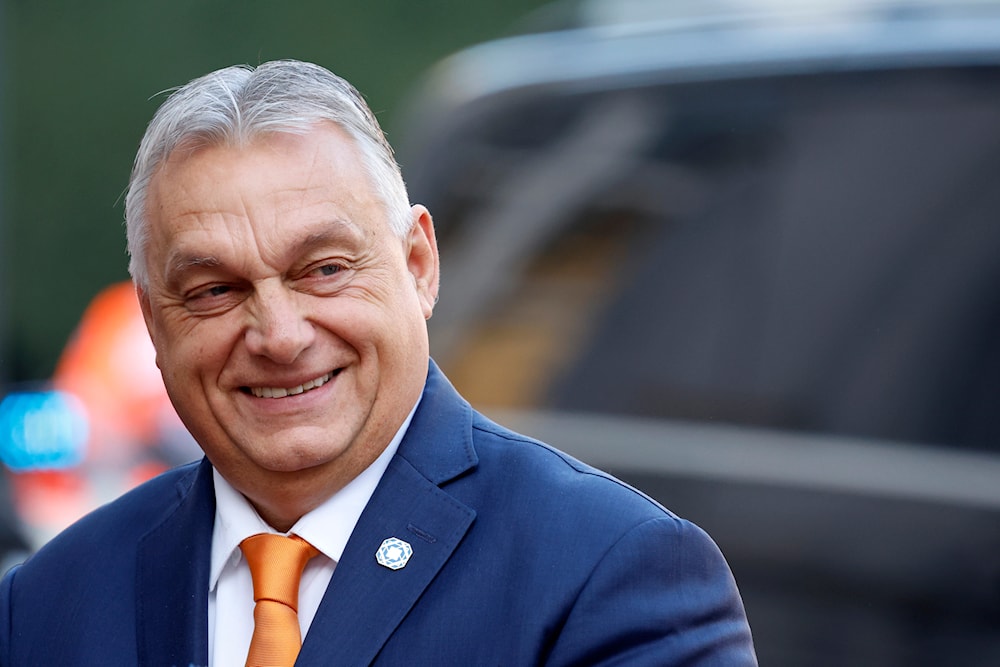Hungary diverges from EU by proposing Ukraine as a 'buffer zone': FT
Hungary is set to oppose the EU again at a leaders' summit, rejecting Ukraine’s rapid accession and military aid, with EU Minister János Bóka arguing for a Ukraine "buffer zone".
-

Hungary's Prime Minister Viktor Orban arrives for an EU summit at the Egmont Palace in Brussels, on February 3, 2025. (AP)
A Financial Times (FT) report on Thursday revealed that Hungary will again vote against the rest of the EU at a leaders’ summit today, as Budapest doubles down on its opposition to Kiev's rapid EU accession and sending it military aid, the country’s EU minister told FT's correspondent.
Hungary is going against the EU mainstream on Ukraine, pushing sanctions against Russia and holding up billions in financing for Kiev by arguing they "prolong the war."
In an interview with the Financial Times, Hungarian EU minister János Bóka admitted that Budapest was adopting a more assertive stance, stating that with Donald Trump’s potential return to the White House, the EU should cease its support for Kiev through arms and financial aid.
Boka said, "We do not see the security of Europe in the integration of Ukraine into defense systems, but we see the need for a buffer zone between Russia and European defense structures, which serves the interests of both Russia and Europe."
He said, referring primarily to the US and Russia, “Ukraine can only function as a buffer zone if there is a consensus among global actors on what is possible and what is not possible on the territory of Ukraine,” adding, “Otherwise, it will be a conflict zone, not a buffer zone.”
Boka further warned, “If either the US or the EU does something in Ukraine without [Vladimir] Putin’s approval, this in itself is a source of conflict.”
The report mentioned that diplomats from other EU nations recognized that Hungary’s "strategic divergence" from its allies seemed irreconcilable, and informal talks were underway to find ways to bypass Budapest’s veto in unanimous decision-making.
That said, one senior EU diplomat said: “Continued opposition towards Ukraine sooner or later must have conclusions for the position of Hungary,” adding that some EU foreign ministers discussed repercussions for Budapest at a meeting on Monday. “This debate has been launched.”
Hungary’s confidence is bolstered by Trump’s warming ties with Moscow, which Bóka described as driven by both geopolitical and ideological factors.
He said that many make the same mistake of underestimating the extent of the Trump administration's dislike of European institutions, adding that "Trump sees the EU not just as an international body with opposing interests, but as a political opponent, and treats it accordingly."
Boka also said Hungary’s “reservations” about the sanctions on Russia had “intensified”, as they in his view threaten to undermine the peace process.
“We do not want decisions on the sanctions regime to become an obstacle to the ceasefire and peace negotiations . . . We should be talking about the extent to which sanctions help or hinder this specific peace process,” Bóka said.
Hungary may block renewal of EU sanctions on Russia: Reports
On that note, earlier this month, Hungary signaled possible resistance to the European Union's upcoming renewal of sanctions on Russia, which must be unanimously approved by all 27 member states before they expire on March 15.
According to a report by Euractiv, Budapest could use its position to delay or challenge the extension during upcoming discussions.
At last week's emergency EU summit on Ukraine, Hungary was the only member state that declined to endorse a joint statement adopted at the meeting's conclusion. While the issue is set to be revisited at the next EU summit on March 20-21, sources cited by Euractiv suggest that Hungary did not actively obstruct the initiatives proposed by other states.
The report notes that Budapest did not directly challenge the sanctions or the transit of Russian energy resources but may have been reserving its efforts for the next round of talks.

 4 Min Read
4 Min Read









